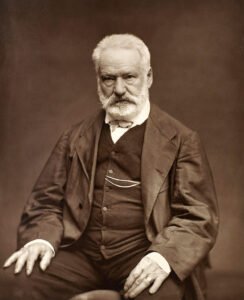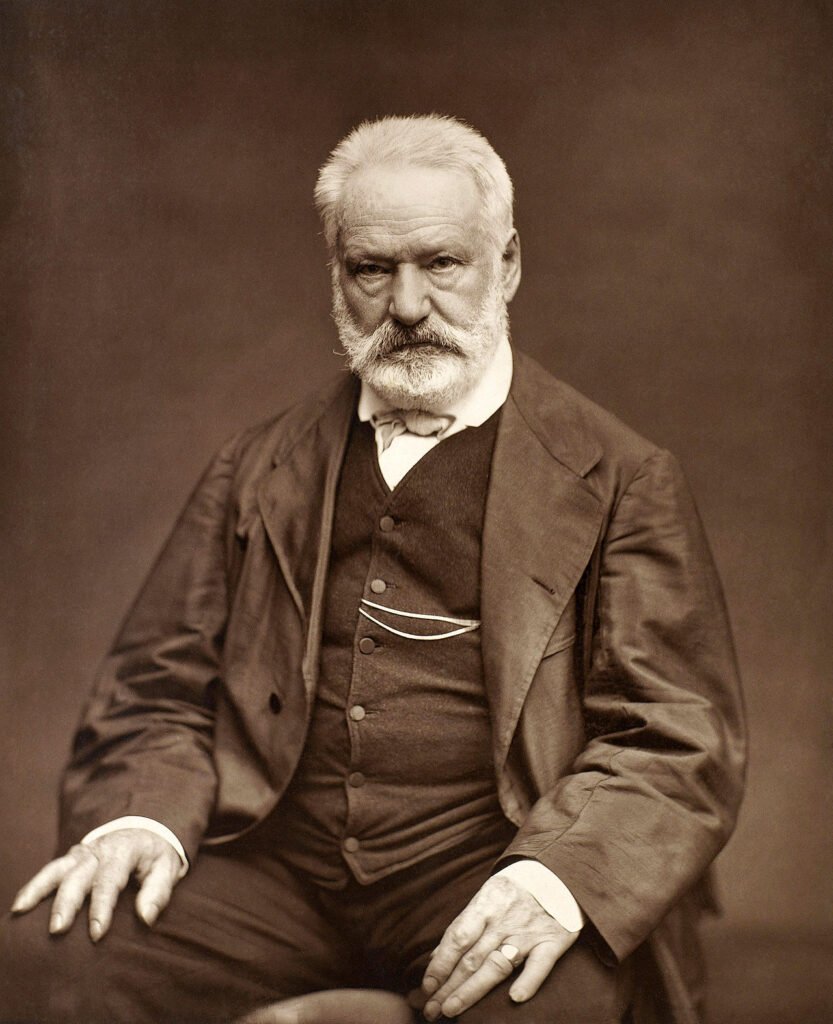Victor Hugo, the Legendary French Writer
Victor Hugo, born on February 26, 1802, was a legendary French writer whose powerful words continue to captivate readers worldwide. His remarkable literary career spanned over six decades, during which he produced an extensive body of work that includes novels, poetry, plays, essays, and political speeches. As one of the leading figures of the Romantic movement, Hugo’s writings were known for their emotional depth, social criticism, and vivid descriptions of human experiences. Beyond his literary achievements, Hugo’s political activism and humanitarian efforts further cemented his legacy as an influential figure in French history and culture.

Early Life and Education of Victor Hugo
Victor Hugo was born in Besançon, France, into a middle-class family. His father was an officer in Napoleon’s army, and his mother was a devoted Catholic. From an early age, Hugo displayed a passion for literature and writing. He excelled in his studies and won several academic awards. His fondness for poetry was nurtured by his mother, who encouraged him to explore his creativity. Tragically, Hugo’s parents separated when he was just ten years old, leaving a lasting impact on his upbringing and shaping his worldview.
Hugo’s Literary Career: A Prolific Writer Emerges
Hugo’s literary career took off in his early twenties when he published his first volume of poetry, “Odes et Poésies Diverses,” in 1822. This marked the beginning of his prolific output, which would span across various genres and encompass several masterpieces. His novels, such as “Les Misérables” and “The Hunchback of Notre-Dame,” are considered literary classics and have been translated into numerous languages. Hugo’s writing style was characterized by its poetic prose, rich imagery, and intricate character development, which resonated deeply with readers of his time and continues to do so today.
Exploring Victor Hugo’s Notable Works
Victor Hugo’s literary repertoire encompasses a wide range of genres, each showcasing his versatility and creativity. His novel “Les Misérables,” published in 1862, is a sweeping epic that delves into themes of social injustice, redemption, and the resilience of the human spirit. The Hunchback of Notre-Dame,” published in 1831, tells the tragic tale of Quasimodo and shines a light on societal prejudices. Additionally, Hugo’s poetry collections, including “Les Contemplations” and “The Legend of the Ages,” showcase his profound insights into love, loss, and the human condition.
Victor Hugo’s Contribution to Romanticism
Victor Hugo was a central figure in the Romantic movement, which flourished in Europe during the 19th century. His works embodied the key characteristics of Romanticism, including a focus on human emotions, the expression of individuality, and a celebration of nature. Hugo’s vivid descriptions and introspective narratives captured the essence of Romanticism, making him a prominent figure in this artistic and literary movement.
Political Activism: Hugo as a Voice for Change
Throughout his life, Victor Hugo used his platform as a writer to advocate for political and social change. He was a staunch Republican who fought against the monarchy and championed the ideals of freedom, equality, and justice. Hugo’s political activism is evident in his writings, where he openly criticized the social injustices and hypocrisy of his time. His speeches and essays, such as “Napoleon the Little” and “The History of a Crime,” shed light on the corrupt political landscape and prompted public discourse on these issues.
Exile and Return: A Turbulent Period in Hugo’s Life
In 1851, following the coup d’état by Louis-Napoléon Bonaparte, Hugo was forced into exile for his opposition to the new regime. He spent nearly two decades living in various countries, including Belgium, Jersey, and Guernsey. While in exile, Hugo continued to write and publish influential works. It wasn’t until 1870, after the fall of the Second French Empire, that he was able to return to France. This period of exile and subsequent return deeply influenced both his personal and literary life.
Victor Hugo’s Impact on French Literature and Culture
Victor Hugo’s impact on French literature and culture cannot be overstated. His works continue to be widely read and studied in schools and universities, and his influence can be seen in the works of subsequent generations of writers. The themes of social justice, morality, and the human condition explored in his writings remain relevant to this day, resonating with readers across the world. Hugo’s literary contributions have shaped French culture and left an indelible mark on the literary landscape.
Hugo’s Humanitarian Efforts: A Philanthropic Soul
Beyond his literary accomplishments, Victor Hugo was a compassionate and philanthropic individual. He actively advocated for the rights of the marginalized and oppressed, including advocating for the abolition of the death penalty and improving the conditions of the poor. Hugo’s empathy and concern for social issues were evident in his support for various charitable organizations and his dedication to effecting positive change within society.
Legacy of Victor Hugo: Remembering a Literary Icon
Victor Hugo’s legacy as a literary icon lives on, even two centuries after his birth. His contributions to French literature, his unwavering political activism, and his humanitarian efforts have solidified his place in history. Hugo’s ability to evoke strong emotions through his writing and his exploration of complex themes continue to inspire writers and readers alike. He remains an influential figure whose impact transcends time and borders.
Victor Hugo’s Influence on Modern Literature
Victor Hugo’s influence extends far beyond the 19th century Romantic era. His innovative storytelling techniques, complex characterizations, and exploration of social issues have paved the way for modern literature. Many contemporary authors continue to draw inspiration from Hugo’s works, incorporating his themes and writing style into their own creations. His influence can be seen in the works of writers such as Gabriel Garcia Marquez, Isabel Allende, and even in popular genres such as fantasy and science fiction.
Rediscovering Hugo: Popular Adaptations of his Works
Victor Hugo’s timeless stories have been adapted into numerous films, television series, and stage productions, allowing his works to reach new audiences. The musical adaptation of “Les Misérables” has achieved worldwide acclaim and continues to captivate audiences with its powerful storytelling and memorable songs. Similarly, “The Hunchback of Notre-Dame” has been the subject of countless adaptations in various forms of media, showcasing the enduring popularity and relevance of Hugo’s narratives.
OUTRO:
Victor Hugo’s contributions to the world of literature, his advocacy for political change, and his philanthropic endeavors have solidified his status as a legendary figure. His words continue to resonate with readers, sparking conversations and inspiring social change. As we look back on his life and work, we are reminded of the power of literature to provoke thought, evoke emotions, and shape the course of history. Victor Hugo’s legacy will forever be cherished as a testament to the enduring impact of a legendary French writer.

